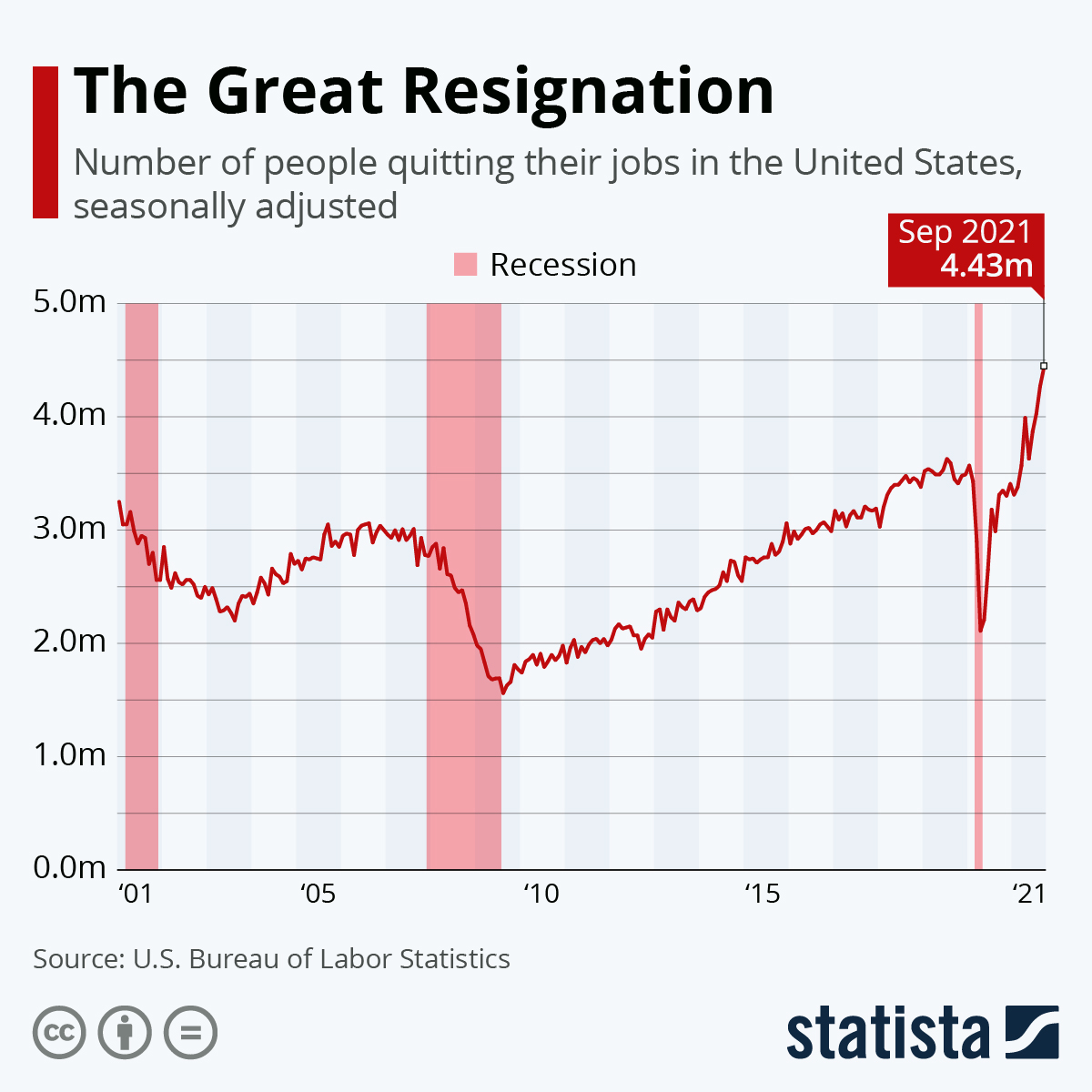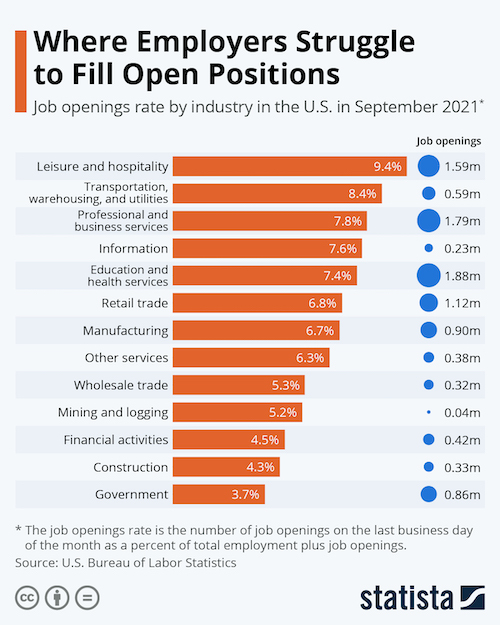COVID-19 Bulletin: November 16
More news relevant to the plastics industry:
Some sources linked are subscription services.
Supply
- Oil prices were flat Monday, while futures were lower in late morning trading Tuesday, despite a new report from the International Energy Agency suggesting rising demand for transportation fuel and continued shortages of natural gas will outweigh near-term production increases from the U.S., Saudi Arabia and Russia. WTI was down 0.5% to $80.51/bbl, while Brent was off 0.1% to $82.00/bbl. U.S. natural gas was 5.5% higher at $5.30/MMBtu.
- Russia joined OPEC+ in pushing back against U.S. calls to increase the cartel’s output, alleging there is no shortage in the oil market, and a surplus is likely to emerge by early next year.
- European natural gas futures jumped 12% to a three-week high yesterday after German regulators suspended certifying Russia’s Nord Stream 2 gas pipeline. The news came just as Russia announced it would begin increasing gas flows to Germany.
- A boost in revenues from offshore oil fields drove Norway’s trade surplus to a record $9.73 billion in October, more than 60% higher than the same time last year.
- BP has secured five LNG carriers on multi-year deals as it aims to secure tonnage amid forecasts of a tight market into next year.
- Amplify Energy withdrew its full-year financial guidance after an oil spill off the coast of California forced the company to suspend production and pipeline operations last month.
- U.S. Appalachian coal prices climbed to $89.75/ton on the spot market last week, a 12-year high.
- Germany’s RWE, the nation’s largest power producer, announced plans to invest $57 billion through 2030 to double its green energy capacity to 50 gigawatts.
- Indonesia, the world’s top importer of thermal coal, will open its carbon trading market on April 1, 2022, with high-emitting firms required to purchase offsets or pay a tax of $2.10 per metric ton of CO2 above allowable levels.
- Our most recent list of force majeure and allocation announcements from suppliers is here.
Supply Chain
- The White House signed a groundbreaking $1.2 trillion infrastructure bill into law Monday, allocating the most significant funding in years to repair the nation’s roads and bridges, upgrade electrical grids and expand access to broadband internet. State officials hope the spending will mitigate the effects of historically severe weather overwhelming weather-protecting infrastructure in place for decades.
- Container rates on Asia-U.S. West Coast routes fell by more than 25% last week, the biggest decline in two years as peak inventory reshelving season winds down.
- The Ports of Los Angeles and Long Beach delayed implementing a new container “dwell” fee on ocean carriers until at least Nov. 22, citing progress in clearing containers without the penalty. The number of anchored container ships waiting off the coast remained near all-time highs at 82.
- The Port of Savannah will begin storing ocean containers at a small airport in Georgia along with other temporary locations to help ease congestion at its terminals.
- Delays at the Panama Canal have led to a 20% week over week increase in Very Large Gas Carrier spot rates alongside an average wait time of 18 days for vessels to pass through.
- Elevated trucking rates led Pitney Bowes to increase its trucking capacity by 42% from last year, a bid to lower the shipping services company’s exposure to the spot market and other third-party transporters.
- The number of vehicles eliminated from production schedules by the global computer ship shortage surpassed 10 million.
- Stellantis, the maker of Jeep SUVs and Chrysler minivans, is laying off a 200-person crew at a northern Indiana transmission plant, citing decreased production due to the global chip shortage. The news comes a week after the automaker announced the layoff of 400 workers at an assembly plant in Illinois.
- Despite an 11% cut in production volumes, Tyson Foods saw revenue rise 12% to $12.81 billion in the third quarter, pushed up by higher prices in grocery stores and restaurants. The cost of cattle jumped by one-fifth annually in the latest quarter, the firm said, while logistics expenses rose 30%.
- Product shortages are prompting grocers to manipulate product arrangements and store layouts to hide physical gaps on shelves.
- Walmart and Home Depot overcame supply chain challenges to beat quarterly sales and earnings estimates.
- For a partial list of automotive disruptions caused by semiconductor and component shortages, click here.
Domestic Markets
- New daily COVID-19 cases in the U.S. jumped 23% over the past two and a half weeks to an average of 78,500, with 21 states reporting a rise of at least 10%. The nation reported 143,685 infections and 1,271 virus fatalities Monday.
- More than 80% of Americans have COVID-19 antibodies through vaccination or infection, new research shows.
- The White House is encouraging those vaccinated against COVID-19 to celebrate together for the holiday season. Meanwhile, survey results show roughly two-thirds of vaccinated Americans are banning unvaccinated relatives from winter gatherings, and almost 75% plan to confine celebrations to family.
- Minnesota now has the worst weekly COVID-19 case rate in the nation. More than 95% of the state’s available inpatient hospital beds have been filled by virus and non-virus patients, leading to cutbacks at emergency departments.
- Vermont reported 222 new COVID-19 cases Monday, giving it the fifth-highest rate of new virus cases in the nation.
- Pennsylvania reported more than 14,000 COVID-19 infections over the weekend, with the state’s weekly case average rising.
- Arizona is the only state with COVID-19 as its leading cause of death throughout the pandemic.
- COVID-19 cases in Nevada are on the rise, with the state’s test positivity rate rising to 7.4% from 6.7% a week prior.
- A growing number of Massachusetts public schools are removing mask mandates after the state reached a milestone of fully vaccinating 80% of its population. In a broader national trend, school districts are frequently allowing students to stay in classes even after exposure to the virus if they test negative.
- New York City followed Colorado, California and New Mexico in expanding COVID-19 booster shots to anyone over the age of 18. Some of the city’s municipal workers have been suspended without pay as officials investigate fake COVID-19 vaccination cards.
- Colorado and Washington state are imposing proof of COVID-19 vaccine requirements on large gatherings.
- Three snow leopards at Nebraska’s Lincoln Children’s Zoo died from complications resulting from COVID-19 infections.
- A federal judge upheld the White House’s COVID-19 vaccine mandate for military personnel. The vaccine mandate for large businesses, however, remains blocked after a federal appeals court ruling last Friday, while labor organizations are calling for the mandate to be expanded to small businesses if it is reinstated.
- Roughly half of people who survive COVID-19 report experiencing at least one symptom six months or more after their initial recovery, aligning with new research showing the same result in children between the age of 6 and 16.
- U.S. flu shots are down 8% this year from the same period in 2020.
- U.S. unemployment remained elevated at 4.6% in October, while the economy still had roughly 5 million fewer jobs than before the pandemic.

- Leisure and hospitality continued to have the most difficulty filling positions:

- Real estate investors bought more than 90,000 U.S. homes in the third quarter, a 10% increase from the prior quarter and 80% more than the same time last year.
- Retail sales rose 1.7% last month, despite rising COVID-19 cases and inflation concerns, beating economist estimates.
- Gold futures had their best week in roughly five months, rising 2.9% to $1,868.50 per troy ounce last week as inflation concerns drove broad gains in non-cash assets.
- International student enrollment at U.S. colleges and universities rose 4% this year following last year’s steep decline of 15% amid the tightest travel restrictions of the pandemic.
- Salaries for MBA graduates are soaring in the tight labor market, with projections of a $115,000 average this year from $105,000 last year.
- The U.S. labor market is the tightest it’s been since the 1950s and will likely remain that way throughout 2022, investment bank Jefferies Group forecasts.
- Nearly 40% of Popeye’s 3,400 restaurants have been forced to close dining rooms early due to labor shortages.
- Nissan will sell models of its Ariya electric crossover solely through reservations when the vehicle launches, bypassing dealerships as automakers test new ways to boost electric vehicle enthusiasm.
- Airbus notched a deal to sell 111 new aircraft to Los Angeles-based jet leaser Air Lease, the plane-maker’s second massive contract announced in the past week at a value likely around $15 billion.
International Markets
- U.K. lawmakers are warning the nation may see additional pandemic lockdowns due to a recent spike in cases. Yesterday, 40,665 new infections were reported alongside 47 fatalities.
- Germany’s COVID-19 incidence rate reached 312 per 100,000 people last week, a record, as officials mull requiring proof of vaccine for access to the nation’s widespread public transit system.
- French elementary schools will require children to wear facemasks as the nation’s daily average of new COVID-19 infections rose above 10,000 yesterday.
- COVID-19 hospitalizations in the Netherlands have risen above previous records set last winter.
- Doctors in Bulgaria have suspended routine surgeries to accommodate surging levels of COVID-19 patients.
- Russia continues to break COVID-19 records day after day, with an all-time high of 1,241 virus fatalities recorded Saturday.
- The number of South Koreans with severe COVID-19 symptoms rose to 495 yesterday, an all-time high.
- The major transport hub of Singapore announced plans to reopen travel lanes to vaccinated people from India, Indonesia, Qatar, the UAE and Saudi Arabia.
- Tokyo reported just seven new COVID-19 cases Monday, its lowest single-day tally of 2021, aided by the highest full COVID-19 vaccination rate among G7 nations at 75.5% of people. The news comes amid estimates that previous cases in the nation’s capital were four times higher than originally thought.
- A new COVID-19 variant identified as B.1.X or B.1.640 has been detected in the U.K., France, Switzerland, Scotland and Italy, raising early concerns among scientists and health experts.
- Israel became the latest nation to approve Pfizer’s COVID-19 vaccine for children as young as 5.
- New Zealand opened COVID-19 booster shots to all adults over the age of 18.
- Public schools in the Philippines reopened Monday for the first time in nearly two years.
- Global COVID-19 booster doses are being administered at six times the rate of initial doses in low-income nations, highlighting the continued disparity in international vaccine rollouts.
- The effectiveness of Pfizer/BioNTech’s COVID-19 vaccine beat out all other major international shots, including those from Russia, China and the U.K.’s AstraZeneca.
- Pfizer said it will license other manufacturers to make its COVID-19 antiviral pill, opening access to 95 countries and over half of the world’s population.
- A virtual meeting between the U.S. and Chinese presidents yesterday was hailed as a positive exchange that sent strong signals of a turnaround in relations, despite many lingering differences.
- Saudi Arabian Airlines is mulling ordering more than 100 Boeing or Airbus jets in a bid to increase tourism to the nation, with plans to have 250 aircraft operating by 2030.
At M. Holland
- M. Holland’s 3D Printing group offers a rapid response alternative for producing selected parts where resin availability is tight during prevailing force majeure. For more information, email our 3D Printing team.
- Market Expertise: M. Holland offers a host of resources to clients, prospects and suppliers across nine strategic markets.
For all COVID-19 updates and notices, please refer to the M. Holland website.